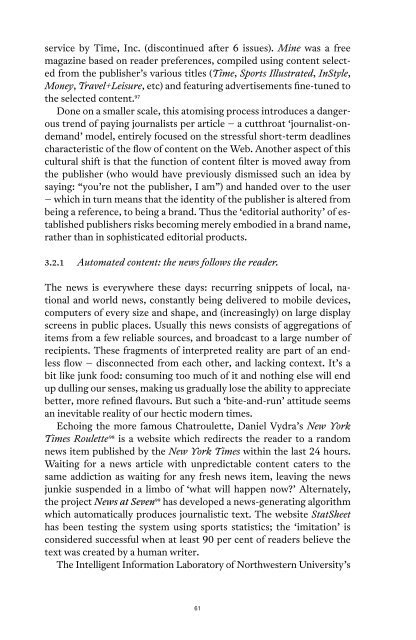Post- Digital Print - Monoskop
Post- Digital Print - Monoskop
Post- Digital Print - Monoskop
You also want an ePaper? Increase the reach of your titles
YUMPU automatically turns print PDFs into web optimized ePapers that Google loves.
service by Time, Inc. (discontinued after 6 issues). Mine was a free<br />
magazine based on reader preferences, compiled using content selected<br />
from the publisher’s various titles (Time, Sports Illustrated, InStyle,<br />
Money, Travel+Leisure, etc) and featuring advertisements fine-tuned to<br />
the selected content. 97<br />
Done on a smaller scale, this atomising process introduces a dangerous<br />
trend of paying journalists per article – a cutthroat ‘journalist-ondemand’<br />
model, entirely focused on the stressful short-term deadlines<br />
characteristic of the flow of content on the Web. Another aspect of this<br />
cultural shift is that the function of content filter is moved away from<br />
the publisher (who would have previously dismissed such an idea by<br />
saying: “you’re not the publisher, I am”) and handed over to the user<br />
– which in turn means that the identity of the publisher is altered from<br />
being a reference, to being a brand. Thus the ‘editorial authority’ of established<br />
publishers risks becoming merely embodied in a brand name,<br />
rather than in sophisticated editorial products.<br />
3.2.1 Automated content: the news follows the reader.<br />
The news is everywhere these days: recurring snippets of local, national<br />
and world news, constantly being delivered to mobile devices,<br />
computers of every size and shape, and (increasingly) on large display<br />
screens in public places. Usually this news consists of aggregations of<br />
items from a few reliable sources, and broadcast to a large number of<br />
recipients. These fragments of interpreted reality are part of an endless<br />
flow – disconnected from each other, and lacking context. It’s a<br />
bit like junk food: consuming too much of it and nothing else will end<br />
up dulling our senses, making us gradually lose the ability to appreciate<br />
better, more refined flavours. But such a ‘bite-and-run’ attitude seems<br />
an inevitable reality of our hectic modern times.<br />
Echoing the more famous Chatroulette, Daniel Vydra’s New York<br />
Times Roulette 98 is a website which redirects the reader to a random<br />
news item published by the New York Times within the last 24 hours.<br />
Waiting for a news article with unpredictable content caters to the<br />
same addiction as waiting for any fresh news item, leaving the news<br />
junkie suspended in a limbo of ‘what will happen now?’ Alternately,<br />
the project News at Seven 99 has developed a news-generating algorithm<br />
which automatically produces journalistic text. The website StatSheet<br />
has been testing the system using sports statistics; the ‘imitation’ is<br />
considered successful when at least 90 per cent of readers believe the<br />
text was created by a human writer.<br />
The Intelligent Information Laboratory of Northwestern Uni ver sity’s<br />
61

















